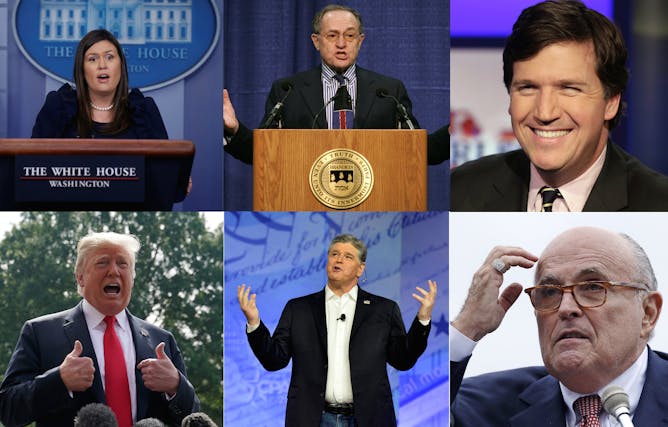Editor's note
|
|
Adolescence can be a rough time and teens are at high risk for depression. Psychologists have known for a while that when people reach out to help someone else, they reap psychological and health benefits for themselves. University of Southern California researcher Hannah Schacter investigated whether teens – even those who were feeling down – would see mood improvements when they lent a hand to a pal.
When Donald Trump’s former lawyer Michael Cohen surrendered to the FBI on Tuesday, he pleaded guilty to violating two U.S. campaign finance laws, among other serious crimes. Law professor Ciara Torres-Spelliscy recounts the presidential scandals that led to the creation of those laws – and explains why the president is in some Nixon-level trouble if Cohen committed those felonies on his orders.
Ask Rudy Giuliani and Alan Dershowitz if Trump did anything wrong, and you’re likely to get two very different responses. Over the past few days, Texas A&M scholar of political rhetoric Jennifer Mercieca has been closely tracking how Trump’s surrogates have reacted to the news of Cohen’s guilty plea – especially the rhetorical strategies they’ve deployed to defend the president.
|
Maggie Villiger
Science + Technology Editor
|

|
|
Top stories
|

Boosting someone else may deliver a mood boost to you too.
Mohamed Nohassi/Unsplash
Hannah L. Schacter, University of Southern California – Dornsife College of Letters, Arts and Sciences
Psychology researchers found that daily acts of kindness were linked to increases in positive mood – especially for teens who felt depressed.
|

Trump’s long-time lawyer and political ‘fixer’ has pleaded guilty to breaking two campaign finance laws, allegedly at the direction of the president.
Reuters/Jonathan Ernst
Ciara C Torres-Spelliscy, Stetson University
Trump's former personal lawyer broke two laws that control political spending, both passed after major election scandals. President Roosevelt survived his campaign's misdeeds. Nixon did not.
|

After the Manafort and Cohen news dropped, many wondered how Trump would respond. By the following morning, a messaging strategy seemed to coalesce.
Nick Lehr/The Conversation via Reuters and AP Photo
Jennifer Mercieca, Texas A&M University
Trump's surrogates have deployed tried and true rhetorical techniques to defend the president.
|
|
|
|
|
|
|
|
|
Ethics + Religion
|
-
Jessica Pierce, University of Colorado Denver
A growing body of evidence points to how animals are aware of death, can experience grief and will sometimes mourn for or ritualize their dead.
-
Mathew Schmalz, College of the Holy Cross
On the day of Rakshabandhan, sisters tie a protective thread around the right wrist of their brothers to affirm their bond. This bond is not limited by faith or blood relationships.
|
|
|
|
From our international editions
|
-
Chris Wallace, Australian National University
In staying hostage to this right-wing lunge, rather than fighting to move it back to the mainstream, Turnbull erased his moderate face, destroying his only utility – electoral utility – to the Liberals.
-
Anna Sergi, University of Essex
In the region of Liguria, and the city of Genoa itself, Calabrian mafia clans have been infiltrating construction projects for decades.
-
Katarzyna Nowak, University of the Free State
There is indeed merit to using beehives to keep elephants from eating and destroying crops.
|
|
|
|
| |
| |
|
|